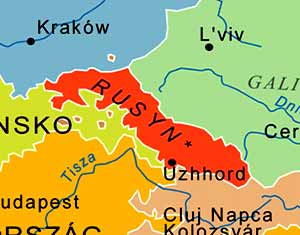11.11.2008
November 2, 2008 (the date of publication in Russian)
Alexander Rublev
"300 SPARTANS" WILL COME TO TRANSCARPATHIA?
Yushchenko opposes Ukraine to Europe by chasing Rusyns
 "Fighting against separatism" is the most favorite affair of Yushchenko administration (the second one is glorification and exalting of OUN-UPA Nazi militants). That is probably why Victor A. Yushchenko's company put off the project of "300 Spartans", within the limits of which Ukrainian secret services and special forces had to attack and occupy the objectives and facilities of the Russian-controlled Black Sea Fleet in the Crimea and then blame Russia in aggression against Ukraine, and began "witch-hunt" on the other side of Ukraine – in Transcarpathia.
"Fighting against separatism" is the most favorite affair of Yushchenko administration (the second one is glorification and exalting of OUN-UPA Nazi militants). That is probably why Victor A. Yushchenko's company put off the project of "300 Spartans", within the limits of which Ukrainian secret services and special forces had to attack and occupy the objectives and facilities of the Russian-controlled Black Sea Fleet in the Crimea and then blame Russia in aggression against Ukraine, and began "witch-hunt" on the other side of Ukraine – in Transcarpathia.
Not so long ago the Security Service of Ukraine summoned Dmitry Sidor, the leader of Transcarpathian Rusyns Seym and archpriest of Ukrainian Orthodox Church of Moscow Patriarchy, to the interrogation in context of the criminal case about the "infringement of territorial integrity of Ukraine". For a long time Dmitry Sidor have been experiencing pursuits and psychological pressure in the country, which is called "exemplary democracy of the Eastern Europe" by the US State Department. Several Russian civil society organizations expressed their support to him, the Universal Russian National Sobor (Assembly) among them. But statements of Kiev officials about the disclosure of "Moscow hand" influence over Transcarpathia scarcely should be taken serious.
The activation of Rusyn (also known as Carpatho-Russians; an ethnical group native to Transcarpathia and Subcarpathia) national movements during last half a year isn't connected with "Russian machinations", but with the conclusions, which were made by Rusyns after most Western countries admitted the independence of Kosovo. And more, this event was discussed not only on Ukrainian territory, but also in some EU countries, in the USA and Canada (where plentiful Rusyn diaspora lives).
Against the backdrop of Kosovo precedent Rusyns actively discussed the question about the legitimacy of Ukrainian Constitution on the Transcarpathian territory. The inhabitants of this territory voted for the reestablishment of their national autonomy during the referendum of 1991, when the supreme law of the country was discussed. However, the results of Transcarpathian Rusyns voting are still omitted by the official Kiev.
On October 25, 2008 the delegates of the Congress of Subcarpathian Rusyns declared the resumption of Rusyn state system and demanded the term till December 1 to reorganize Transcarpathian region into the Ukrainian autonomy. As we can see, there is no talk about separatism – Rusyns only want to get rights, which were long ago given to the representatives of national minorities in most countries of the EU.
In fact, the very question about Subcarpathian Russia concerns the relationships between Russia and Ukraine not that much, as the relationships between the USA and the EU. Washington traditionally pursues the course of suppression and assimilation of national minorities in Ukraine, longing to turn the country into anti-Russian and anti-European monolith. However Rusyns (the national minority, still unacknowledged in the country officially, but only on the regional level) have official status in four countries of the EU: the Czech Republic, Slovakia, Poland and Hungary.
Considerable part of Rusyns lives in Slovakia, where their social status is much better than in Ukraine. At the same time we shouldn't forget that Rusyns were absolutely autonomous when Transcarpathia belonged to pre-war Czechoslovakia (1918-1939). The territory of this autonomy had 3 official languages: Rusyn, Ukrainian and also Russian (!).
Heretofore, in the beginning of XX century and during WW1, Rusyns, who mostly supported Russian position, suffered genocide from the Austro-Hungarian Empire. The extirpation was provoked and implemented with the help of Ukrainian nationalists, who operated in the adjacent Galicia. 60 thousands representatives of cultural and intellectual Rusyn elite (priests, teachers, public figures) were annihilated in Teresin and Talerhof concentration camps those years. In recent time Rusyns actively demand the acknowledgement of the fact of genocide by the world community.
Now the situation in Transcarpathia is observed from Bratislava, where the government tries to follow the foreign policy more independent from US. The facts are self-evident: this year Robert Fico, the Prime Minister of Slovakia, showed his regrets that the organizers of bombardment of Yugoslavia in 1999 were still not under the Hague Tribunal prosecution, and then condemned harshly Saakashvili for Georgian invasion in South Ossetia. Slovakia have become oriented towards countries of "old Europe" (like France and Germany), to which Ukraine joining NATO is unprofitable, though the USA, Britain and Poland lobby it.
In wider humanitarian context the support of Rusyn national movement absolutely corresponds with pan-European line of widening the rights of regions with sharply defined ethno-cultural originality. Germany acts as the leading example in this situation. From the other side (from the point of current political aims), the beginning of the negotiations with Kiev about the renewal of Rusyn autonomy might help Berlin and Paris come out of the hard situation, in which they were put by Washington, London and their EU-allies.
Anglo-Saxon axis is trying to foist on Europe a false and tendentious interpretation of possible rejection of MAP status to Ukraine. The very accordance is defamed as "an inadmissible concession to Russia". If the Ukrainian MAP question will be viewed together with the acknowledgement of Rusyns rights for renewal of national autonomy, Berlin and Paris will get an opportunity to disentangle from Anglo-Saxon trap.
Number of shows: 2488
 ENG
ENG 

 ENG
ENG 
